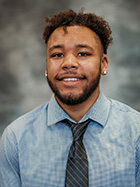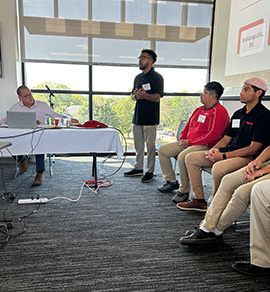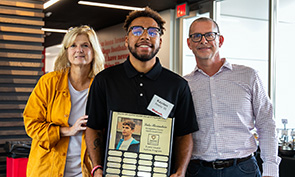When Kayden Beatty ’25 was looking for an internship last year, his fluency in Spanish got him the job, but it was his compassion that set him apart.
A Spanish major from Indianapolis, Beatty didn’t have a clear picture on where to start, he only knew he wanted to put his fluency to good use. One of his professors suggested he try the Wabash Global Health Initiative (GHI) and work with the Montgomery County Health Department (MCHD).
His Spanish-speaking skills would help, but there would be a steep learning curve.
 “With the internship, I knew I would be doing a lot of translating for Spanish-speaking families,” he said. “Beyond that, I was new to the whole idea of what public health entails. This was unfamiliar territory for me.”
“With the internship, I knew I would be doing a lot of translating for Spanish-speaking families,” he said. “Beyond that, I was new to the whole idea of what public health entails. This was unfamiliar territory for me.”
He quickly dove into the MCHD’s activities, from mosquito vector control, vaccination administration, producing public documents and digital media projects to home and food inspections. Beatty says there was some hesitation as he adjusted to life in the public health sphere, but found the translations most enjoyable because his skills helped him connect to people.
“I got to experience the real life that exists not more than 15 minutes from campus,” he explained. “You get to see what life is like and the conditions in which people are living.”
That’s what makes the Global Health Initiative a rewarding experience—both the student and the public directly benefit. Even a Spanish major with no public health experience can quickly contribute in positive ways.
“There’s no interest that students have, there’s no major that can’t connect in some way to the work we’re doing,” said Eric Wetzel, professor of biology and director of the GHI.
Associate GHI director Jill Rogers added, “You only have to care about community. If you care about community,  there’s a place for you.”
there’s a place for you.”
The summer experience reminded Beatty of his upbringing. He grew up in a multicultural family—his father is African American and his mother Hispanic and white. He attended a multilingual elementary school where English was taught in the morning and Spanish in the afternoon.
As he’s grown older, the Spanish major has a better appreciation for that experience and its benefits. He became comfortable in different environments, codeswitching, and getting to see the world from different perspectives.
That brought him to Wabash where he could both explore his options and step outside his comfort zone.
“My passion is to make an impact on the world in a positive manner,” said Beatty, a member of the Malcolm X Institute of Black Studies. “As soon as I was brought into this internship, I could tell I was going to be presented with an opportunity to do so. To connect it with my bilingual skills made even more of an impact for me.”
Following his internship, Beatty was awarded the Luke Borinstein Award, given by the Montgomery Country Public Health Department to select interns who exhibit great achievement, adaptability, determination, and drive.
Borinstein ’19 was a Wabash student with “an eagerness to do good,” who passed away in a plane crash in 2016. The honor is a rare distinction given only three times since his passing.
 More than being a good intern, the award signifies a greater connection not just to Borinstein and his legacy, but to the community.
More than being a good intern, the award signifies a greater connection not just to Borinstein and his legacy, but to the community.
“Kayden is passionate about using his knowledge and skills to break down barriers,” said Diamond Teague, Montgomery County Health Department health educator. “Kayden led with kindness and transparency, conducting his work without bias. He never hesitated to jump in, navigated his tasks with confidence, and always asked questions.”
Beatty understands his privileged position allows him to help others where he can, often through language. He mentioned a quote by Ludwig Wittgenstein, an Austrian philosopher, that summarizes his feelings.
“The limits of my language mean the limits of my world,” Beatty concluded. “I love that quote because it shows that language is more than a form of communication, it’s a means of understanding others and interpreting the world around us.”